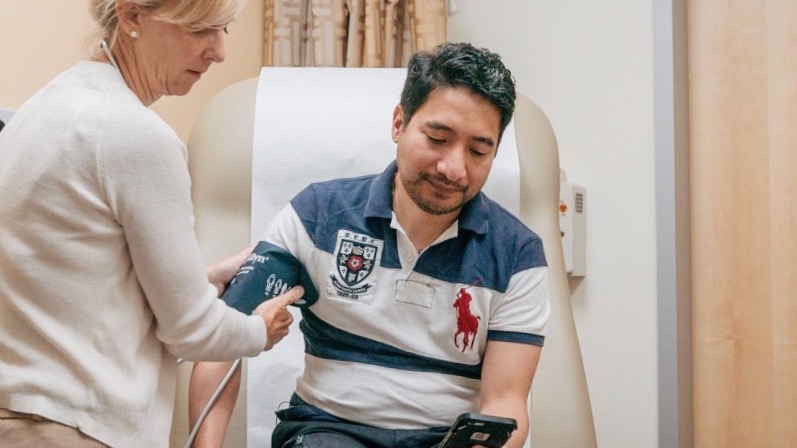For some people, blood pressure readings register higher than usual when they visit the doctor. That's called "white coat hypertension."
For others, measurements hover in a normal range at their physician's office, but are higher in other settings. That condition is known as "masked hypertension." It often goes unrecognized, but carries a heightened risk of stroke and other cardiovascular problems
Eugene Celis knew his family's history of heart disease meant he should be careful about diet and exercise. But it wasn't until he enrolled in Stanford Medicine's Humanwide pilot project -- and started tracking his blood pressure regularly at home -- that his primary care providers discovered he had masked hypertension and were able to take steps to manage the condition.
The fourth video in the Humanwide series tells Celis' story.
In the yearlong Humanwide pilot, a primary care team partnered with 50 patients to demonstrate a new precision health approach to preventive care. Using data from at-home digital devices, genetic tests and other sources, the team pieced together individualized, comprehensive health portraits which then informed personalized care plans focusing on current concerns and future risks for each participant.
As Megan Mahoney, MD, Stanford's chief of general primary care, explained in the video, each patient received four devices to track key health metrics outside the clinic: a pedometer, a digital scale, a glucometer and a home blood pressure cuff.
"These devices are important because clinicians now can tailor the care according to a patient's individual physiology in a way that they haven't been able to do before," said Mahoney, who was the lead for Humanwide.
Celis was well aware of his family's predisposition for cardiovascular disease before he joined Humanwide, but the project helped him collect objective data to better understand his health.
At a clinic visit, he, Mahoney and his nurse practitioner compared readings from his at-home blood pressure cuff with measurements taken at the clinic. That conversation was a turning point. After more tests, Celis was diagnosed with hypertension, and prescribed medication to control the condition. He's not a fan of prescription drugs, so he wasn't thrilled. However, he did appreciate Humanwide's data-driven approach to lessening risk for future disease. Celis said:
This study opens a lot of new thinking... as to how you detect problems. I like the fact that they're doing it systematically, not just guessing. What motivates me about this program is I see the results [in] real time. That keeps me motivated, in terms of improving my health and my lifestyle.
Photo by Luceo






